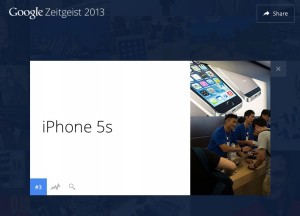
So, what do these rankings mean for consumers?
Deciding which smartphone to purchase is going to get more difficult.
The way the rankings work for trending searches (those in the global Top Trending and Consumer Electronics categories, among others) is that the “topics with the largest increase in search volume since the previous period” are listed. The ranking of a trending topic correlates with public interest; after all, why would anyone search for a product they weren’t considering buying? The third and first place rankings of the iPhone 5s show that Apple’s products continue to be the most sought after on the market.
However, look at Apple’s competitors. Look at the direction in which they’re taking their smartphones and tablets. The design of the Galaxy S4 is advertised as “sleek and stylish.” The Blackberry 10’s “features and apps work together seamlessly.” Sleek. Stylish. Seamless. These very characteristics are what Apple seeks to offer. And it succeeds, and has succeeded, since the very first iPhone.
I’m not in any way claiming that other smartphones are inferior. Different customers have different needs, some of which are very specific. Some people value a crystal clear picture over other features, and some people prefer a product because they’re loyal to its brand. What I am positing is that smartphone companies are moving into the trends that Apple set a long time ago: simplicity in usage and design. The company has kept its focus on providing a well-crafted smartphone with a user-friendly interface. Since that motif of simplicity is spreading across brands, it is becoming increasingly difficult for consumers to choose a phone. They compare products online, read customer reviews, and go to retail stores geared with a long list of questions—in short, they go through a lot of trouble to find the phone that best fits their needs.
It’ll be interesting to see what the market for smartphones looks like in 2014. We’ll keep you updated in the New Year.
Photo Credit: MacRumors